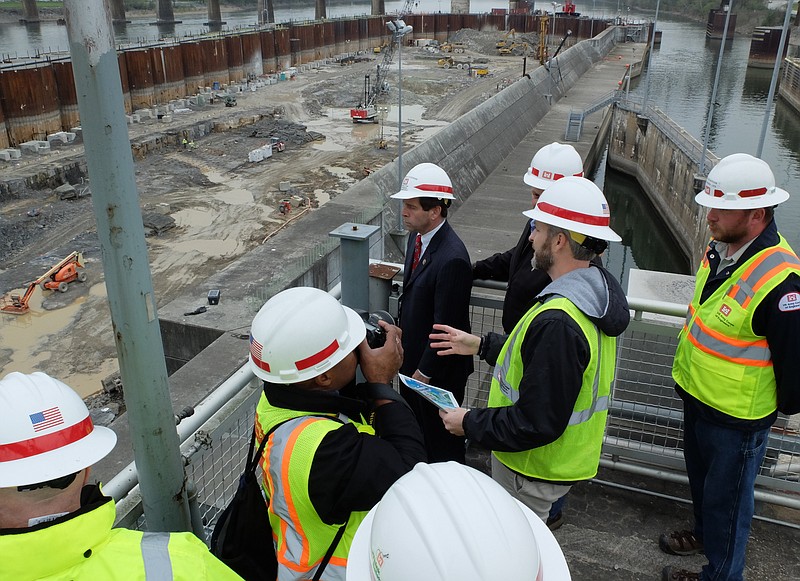U.S. Reps. Chuck Fleischmann and Scott DesJarlais watched as crews worked to blast roughly 100,000 cubic yards of rock Monday morning to help anchor the new 110-foot-by-600-foot Chickamauga lock.
The two East Tennessee Republican lawmakers were there touring the progress made on construction of the new lock, which will replace the smaller and crumbling existing lock along the Tennessee River. With $78 million in funding for the 2018 fiscal year for planned construction at the new lock and over $90 million appropriated in 2019, the congressmen said having more consistent funding will help move the lock to an estimated completion date of 2024.
"It looks like the progress is great," DesJarlais said. "It's always a funding issue with anything in the government, but it looks like the [revenue] stream is flowing now and the work is being done."
The $1.3 trillion spending plan for the rest of the fiscal 2018 budget will more than double funding for work on the new Chickamauga lock this year. The budget plan provides a record $6.8 billion to the U.S. Army Corps of Engineers, which will also provide $1.7 million for dredging at Memphis Harbor McKellar Lake as part of $1.4 billion for the Harbor Maintenance Trust Fund.
The Corps of Engineers, which is building the new lock, has spent more than $210 million over the past 11 years to design and start building the lock that is 28 percent complete. But as work has been delayed by budget shortfalls over the past decade, the cost of the new lock is estimated at $760 million if completed by 2024.
Fleischmann said at one point that the projected cost could be $815 million.
"As you know, the further you go out with construction projects, the greater the cost can be," he said. "The good news is that for five years we've actually had funding on the new lock project."
The economic impact this new lock could have on the barge industry is far-reaching, said Cory Richardson from the Corps and who led the tour Monday.
After completion, the new lock would be able to move nine barges in one hour compared to moving just one in that time frame with the old lock. Richardson said the current lock can move nine barges in about 12 hours, costing tow companies anywhere from $800-$1,200 an hour in employee expenses.
"The lock we have now limits the traffic flow through here and this much wider, newer lock will help deal with the bottleneck we are facing," DesJarlais said.
The Corps also spent about $3.5 million from its operating budget to install new gate anchors and other fixes to shore up the upper gates on the existing Chickamauga lock, which suffers from problems with "concrete growth" in the rock aggregate used to erect the lock when TVA built the facility in the 1930s. The lock was forced to close for six days so repairs could be done to the gates.
Fleischmann, a member of the House Appropriations Committee, said the Chickamauga lock is the fourth-highest funding priority for inland water projects in the nation, behind only Olmsted on the Ohio River northwest of Paducah, Ky., the Lower Monongahela River in Pennsylvania and the Kentucky Lock on the Tennessee River in Kentucky. Fleischmann said he will continue to advocate for this project until its completion.
"Tennessee's 3rd District is home to countless businesses all of which need reliable, efficient means to transport their goods and raw materials," he said. "I am optimistic that once this project is completed, it will not only be great for current business but will also create even more incentive for economic opportunity and future business."
Contact staff writer Allison Shirk at ashirk@timesfreepress.com or 423-757-6651. Follow her on Twitter @Allison_Shirk.

